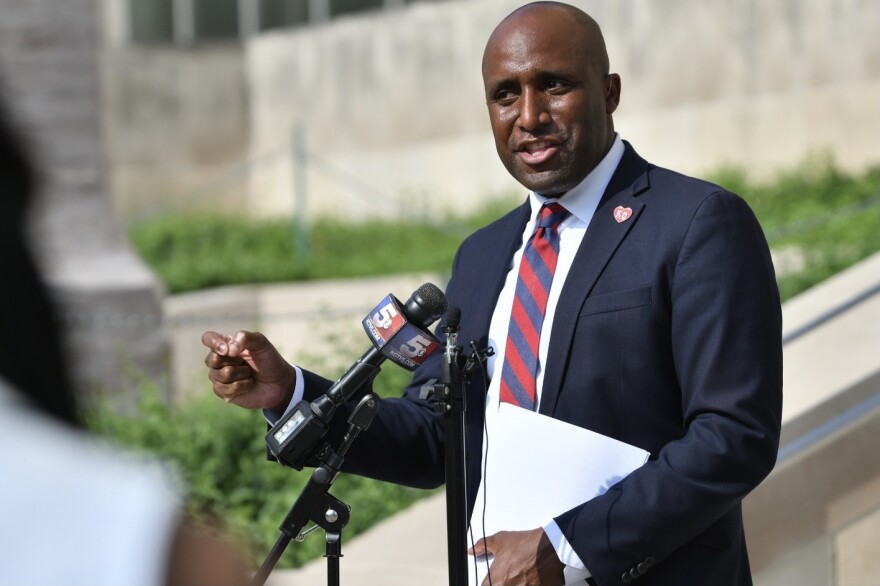The Missouri attorney general’s office argued Wednesday that a state law raising the minimum funding Kansas City must provide its police department doesn’t impose any cost on the city or violate the state constitution.
Deputy Solicitor General Jeff Johnson, representing the state auditor and secretary of state, told the Missouri Supreme Court Wednesday that legislation forcing Kansas City to spend at least 25% of its budget on policing simply removes City Hall’s discretion, since Kansas City already routinely spends that much on police.
“It doesn’t represent an additional cost if now the discretion to fund the police department is removed from City Council and given to the (Kansas City) Board of Police Commissioners,” Johnson said.
Jim Layton, representing Kansas City Mayor Quinton Lucas, argued the legislation is an unfunded mandate barred by the Missouri Constitution. The city was previously only required to spend 20% of its budget on police.
“This mandate costs millions, not nothing,” Layton said. “It costs millions.”
Layton and Johnson’s arguments before the Missouri Supreme Court come in a challenge — by Lucas — of a November 2022 statewide vote that increased the minimum percentage of its budget Kansas City must spend on its police department. Lucas’ challenge, filed in the months after the vote, argues a fiscal note summary accompanying the ballot was misleading and the results of the election should be tossed.
The fiscal note summary accompanying the November ballot said the amendment would result in “no additional costs or savings,” though the city argues the amendment has a negative financial effect on its budget.
“Missouri voters should have the opportunity to make an informed choice about their Constitution — a choice they can make only if they are presented with accurate information regarding the amendment’s fiscal impact on the city,” Lucas’ attorneys argued in a brief filed with the Missouri Supreme Court last month.
Lucas is seeking a new election on the issue.
Kansas City is the only major city in the U.S. that doesn’t control its own police department. Instead, the city’s police department is governed by the Kansas City Board of Police Commissioners, which includes the mayor and four members appointed by the Missouri governor. That means while the City Council writes the checks, it doesn’t control how police funds are spent.
Gov. Mike Parson last summer signed legislation to force Kansas City to spend at least 25% of its annual budget on the police department.
But for the legislation to take effect, voters also had to pass an amendment to the Missouri Constitution to bypass a provision barring the state government from imposing spending requirements on local governments without providing funds. The amendment, which the city is challenging, exempted police funding in Kansas City from the ban on unfunded mandates.
Missouri voters passed that amendment 63% to 37% in November.
This spring, Kansas City passed its first budget under the new spending requirement. Out of the city’s $2 billion budget, the Kansas City Police Department received $284.5 million.
The legislation, the mayor argued in a Supreme Court brief, followed a heated exchange the mayor had with Nathan Garrett, then a member of the Board of Police Commissioners. The Kansas City Council had attempted to exert some discretion over how police funds are spent, which a judge ultimately determined it wasn’t authorized to do.
When city officials tried to exert influence over how police funds were spent, according to Lucas’ petition, Garrett told the mayor the “state swings a bigger stick” than City Hall.
“Mr. Lucas understood that to be a threat that the state, or at least those closely connected to Mr. Garrett, would attempt to punish the city for attempting to exercise discretion over funds it had allocated to the board as a matter of discretion,” the brief says.
In the runup to the November vote, the state sought clarity from the city regarding what the amendment might cost City Hall. The city responded that the increased funding requirement could remove its budgeting flexibility and potentially result in cuts to other departments of up to $38.7 million.
The state’s brief calls that calculation “entirely illusory” because the city had funded the police department at close to 25% during that budget year. Police funding would have represented an even larger share of the budget had the city not received an influx of cash from federal stimulus spending.
The mayor’s desire to retain discretion over police funding is “understandable,” the brief says.
“That does not justify telling voters that (the amendment) would cost the city $38.7 million annually — when three weeks earlier the city had calculated that it had funded the KCPD at roughly 25 percent for the last three fiscal years,” the brief says.
Aside from the question of whether the fiscal note was unfair, the court is set to consider whether the dispute over the fiscal note is severe enough to warrant holding a new election and whether Lucas has the authority to bring the case after the amendment has taken effect.
The state argues Lucas brought the challenge to the election in his official capacity because he is being represented by the city’s own lawyers and outside counsel paid for from the city budget. Elected officials can’t bring challenges to fiscal note summaries in their official capacities.
This story was originally published by the Missouri Independent.






